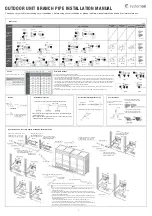
CAUTION
The air-in side should face up when using vacuum cleaner.
(Refer to Fig.5-4)
The air-in side should face down when using water.
(Refer to
Fig.5-3)
5. Re-install the air filter
6. Install and close the air-in grill in the reverse order of step 1
and 2 and connect the control box cables to the corresponding
terminators of the main body .
Do not dry out the air filter under direct sunshine or with fire.
6. FOLLOWING SYMPTOMS ARE NOT AIR
CONDITIONER TROUBLES
Symptom 1: The system does not operate
Symptom 2: Change into the fan mode during
cooling mode
The air conditioner does not start immediately after the ON/OFF
button on the romote controller is pressed.
If the operation lamp lights, the system is in normal condition.To
prevent overloading of the compressor motor, the air
conditioner starts 3 minutes after it is turned ON.
If the operation lamp and the "PRE-DEF indicator(cooling and
heating type) or fan only indicator(cooling only type)" light, it
means you choose the heating model, When just starting, if the
compressor has not started, the indoor unit appears "anti cold
wind" protection because of its overlow outlet temperature.
In order to prevent the indoor evaporator frosting, the system
will change into fan mode automatically, restore to the cooling
mode after soon.
When the room temperature drops to the set temperature, the
compressor goes off and the indoor unit changes to fan mode;
when the temperature rises up, the compressor starts again. It
is same in the heating mode.
Symptom 3: White mist comes out of a unit
Symptom 3.1: Indoor unit
When humidity is high during cooling operation If the interior of
an indoor unit is extremely contaminated, the temperature
distribution inside a room becomes uneven. It is necessary to
clean the interior of the indoor unit. Ask your dealer for details
on cleaning the unit. This operation requires a qualified service
erson
Symptom 4.2: Indoor unit, outdoor unit
A continuous low hissing sound is heard when the system is in
operation.
This is the sound of refrigerant gas flowing through both indoor
and outdoor units.
A hissing sound which is heard at the start or immediately after
stopping operation or defrost operation.
This is the noise of refrigerant caused by flow stop or flow
change.
Symptom 4.3: Outdoor unit
When the tone of operating noise changes.
This noise is caused by the change of frequency.
Symptom 5: Dust comes out of the unit
Symptom 6: The units can give off odours
When the unit is used for the first time in a long time.
This is because dust has gotten into the unit.
The unit can absorb the smell of rooms, furniture, cigarettes,
etc., and then emit it again.
Symptom 7: The outdoor unit fan does not
spin.
During operation. The speed of the fan is controlled in order to
optimize product operation.
Sptom 4: Noise of air conditionerscooling
Symptom 3.2: Indoor unit, outdoor unit
Symptom 4.1: Indoor unit
When the system is changed over to heating operation after
defrost operation Moisture generated by defrost becomes
steam and is exhausted.
A continuous low "shah" sound is heard when the system is in
cooling operation or at a stop.
When the drain pump (optional accessories) is in operation,this
noise is heard.
A "pishi-pishi" squeaking sound is heard when the system stops
after heating operation.
Expansion and contraction of plastic parts caused by
temperature change make this noise.
OWNER'S MANUAL
84
















































